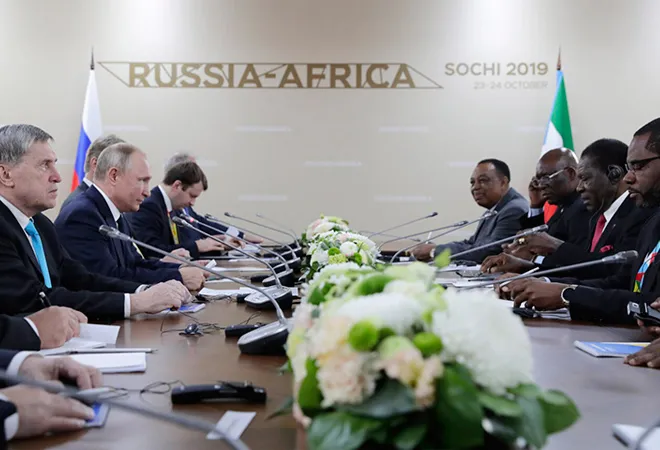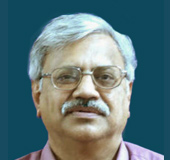
Since the dawn of this century, Russia has made systematic efforts, as a rising power, to recapture its erstwhile position in world politics. These efforts have been facilitated by the domestic political stability under decisive leadership of President Vladimir Putin. Consequently, in 2014 Russia annexed Crimea, fuelled pro–Russian rebellion in Eastern Ukraine, re-established its hegemony over the near east and ensured continuation of the Assad regime in Syria through military support since 2015. Russia’s interactive ties with
Turkey, Iran and Syria have made it a major player in west Asia. Russia’s support to Belt and Road Initiative (BRI) of China and growing ties with India and Pakistan has also enlarged its role in Asia. Russia, like China, the USA, France, and India, has steadily started pursuing its interests in the continent of Africa. In fact, the first Russia-Africa summit, organised
at Sochi in October 2019, has set the pace for promoting the ties between Russia and 54 African countries in multiple areas of common concern. Forty African leaders and 3000 businessmen had assembled in the Sochi summit. By establishing its presence on a Pan African scale, through the Sochi summit, Russia also attempted to enhance its global stature. Indeed, the Russo-Chinese cooperation in the Eurasian region as also Russia’s significant role in international organisations such as G21, Shanghai Cooperation Organisation (SCO) and Brazil, Russia, India, China and South Africa (BRICS) abundantly highlight the growing role of Russia in world politics. In view of countering the formidable Russo-Chinese partnership,
John Bolton, US National Security Advisor, announced new American strategy in 2018 to serve the American interests in Africa involving areas from promoting African development to combatting terror.
Russia, on its part, while rekindling its association with African states took full advantage of the positive role that the Soviet Union had played in supporting national liberation struggles as well as anti-apartheid struggles in Africa. Besides, in the context of the Cold War, the Soviet Union had offered economic assistance as well as military support to the so called radical African countries such as Ghana, Guinea and Mali (1960s) and Algeria, Ethiopia, Libya, Angola, Mozambique, Zimbabwe (1980s) that opposed western imperialism. Russia, in general has continued with its anti-west stance. In contemporary times, while recasting its relations with Africa, geo-strategic considerations have shaped the Russian policy in Libya, Central African Republic (CAR) and the Horn of Africa.
Evidently, Russia has broader interests to pursue in West Asia and the Mediterranean. As a result, oil rich Libya with its location on the southern flanks of Europe is a natural candidate. In spite of his strings of defeats, by supporting
Khalifa Hafter, a rebel leader, against the UN led Tripoli government supported by Turkey, Russia has been participating in the Libyan civil war. In June 2020, among the
Russian mercenaries that were fighting the war, 1,200 personnel reportedly belonged to Wagner Group, controlled by Yevgeniy Prigozhin, a businessman with allegedly close ties with Kremlin. Besides, the United Arab Emirates (UAR) is supporting Khalifa Haftar with advanced Russian weapons as well as Chinese made drones. What is more, Egypt, France, Jordan and Saudi Arabia are also extending their support to Khalifa Haftar in their own interest. Similarly, Russia’s involvement is increasing in the uranium rich
CAR since 2017. The CAR is selling mining rights for gold and diamonds at throw away price to Moscow. The Russian presence is felt through trainers, military personnel as well as Valry Zakharov, a Russian national and security advisor to President Touadera. As the western countries shunned Sudan, Russia also was shielding dictatorial regime of Omar al Bashir (1989-2019) in oil rich Sudan by supporting it at the
United Nations Security Council (UNSC) during the Darfur crisis in 2000s while winning support in Muslim countries. Furthermore, during the Cold War the Soviet Russia had alternated between Somalia and Ethiopia as allies to maintain its foothold in the Horn of Africa. Since France, China and the USA already have their presence in the Horn of Africa; Russian officials are working towards establishing a
base in the Horn. This base most likely will be built in the coastal self-declared state of Somaliland, through the port of Berbera.
Russia’s military relations with African countries have a long history. In fact, post-apartheid Presidents such as Thabo Mbeki and Jacob Zuma had undergone military training in the Soviet Union. Similarly, Jao Lourenco, the current Angolan President, was trained in Lenin political/Military academy in the 1970s. South Africa and Angola are resource rich countries. Russia is gradually expanding its activities from Algeria in the north to South Africa in the south of the continent. Being the first and the longest customer, Russia has been consistently
selling arms to Algeria. At the Sochi summit Russia struck an
arms orders worth $14.6 billion with African countries and sales to the African continent amounts to one third of Russian military exports. In 2017-18, Russia has had
weapons deals with resource rich countries such as Nigeria, Angola, Equatorial Guinea, Sudan, Mali, and Burkina Faso. Besides, during the Sochi summit President Putin asserted that more than 30 African countries have
‘military and technical cooperation related agreements’ to supply weapons with Russia. Unlike the western countries, Russia has never been particular about violation of human rights while delivering weapons to even autocratic regimes. The deal of Zimbabwe’s brutal Mugabe regime concerning
arms for platinum struck in 2014 is a case in point. Further, by 2017, Sudan under Bashir bought half of its weapons from Russia and emerged as the
second largest buyer of weapons from Russia in Africa. Russia had also extended the support of Private Military Contractors to beef up the security of the Bashir regime. Since 2017, Russia began to support
Sahel 5 states i.e. Mali, Burkina Faso, Mauritania, Niger and Chad in their bid to find African solutions to African problems while fighting terrorism sponsored by outfits related to Al Qaeda and Islamic State (IS) by offering military support. What is more, Russia wants to gain foothold in gas rich Mozambique. Its mercenaries, including those from
Wagner, have been engaged in fight against
jihadist terror since October 2019. In substance, even if Russia is unable to provide money to African countries like China, it can provide muscle power through arms.
Russia’s strength on ground is perceptible owing to the growing presence of state private as well as privately owned companies in resource rich African countries. Alrosa, the world’s largest diamond mining company, is operating in Angola, Botswana and Zimbabwe. Russian oil and gas companies such as
Rseneft, Luckoil, Gazoprom, Gazopromneft, Tatneft and Rosgeologia are all having business in different countries in Africa, especially the North and West Africa. Russia currently accounts for six percent energy market in Africa which it wants to raise to 15 percent by 2025. Countries such as Mozambique, Tanzania, Egypt and Equatorial Guinea are likely to come on stream within the next five years. Moreover, Russian state atomic energy corporation (Rosatom), a power company, is active in 14 African states, including Zambia and Rwanda. It is well equipped to provide nuclear as well as non-nuclear power for civilian purposes such as medicine, agriculture and hydropower sector. It is about to commence the construction
El Dabaa nuclear power project in Egypt to be completed in 2026. This will be Egypt’s first nuclear mega nuclear plant. Another Russian company, namely Rusel is extracting Bauxite in Guinea which happens to be the holder of the world’s largest bauxite deposits. When Guinean President Alpha Condé tried to set aside the limit of two terms for Presidency and introduced new constitution to get the third term,
Russia gave him the required support although, France, a former colonial power had warned him about the likely civilian unrest. Besides, the Russian geologists have been active in countries such as Madagascar, Algeria, Libya and Ghana in their exploratory ventures.
Compared to China, India the USA and European Union countries, Russia’s trade with Africa is almost negligible. By August 2019 it has registered growth by 17 percent and yet the total trade with Africa had
reached the figure of $20 billion. Algeria has continued to be the major and traditional trading partner of Russia. The Russian network of trade ties has yet to penetrate significantly in Sub Saharan Africa.
Briefly, in line with significant role of Russia in different major regions of the world, the Russo-African relations have been growing silently in multiple domains. Russia’s ongoing military deals, investments as also the role played by state and privately owned companies involved in energy sector, growing trade, projects of development cooperation and above all interventionist role through mercenaries as well as Wagner in the domestic affairs of African countries like Libya, the CAR and Guinea, indeed indicate stronger possibilities of increasing role of Russia as a major actor in Africa.
The views expressed above belong to the author(s). ORF research and analyses now available on Telegram! Click here to access our curated content — blogs, longforms and interviews.



 Since the dawn of this century, Russia has made systematic efforts, as a rising power, to recapture its erstwhile position in world politics. These efforts have been facilitated by the domestic political stability under decisive leadership of President Vladimir Putin. Consequently, in 2014 Russia annexed Crimea, fuelled pro–Russian rebellion in Eastern Ukraine, re-established its hegemony over the near east and ensured continuation of the Assad regime in Syria through military support since 2015. Russia’s interactive ties with
Since the dawn of this century, Russia has made systematic efforts, as a rising power, to recapture its erstwhile position in world politics. These efforts have been facilitated by the domestic political stability under decisive leadership of President Vladimir Putin. Consequently, in 2014 Russia annexed Crimea, fuelled pro–Russian rebellion in Eastern Ukraine, re-established its hegemony over the near east and ensured continuation of the Assad regime in Syria through military support since 2015. Russia’s interactive ties with  PREV
PREV


